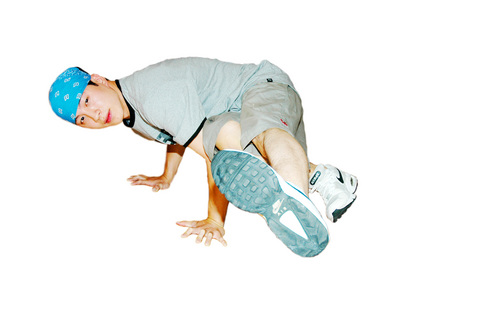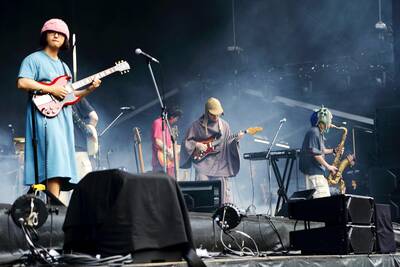Dance-offs have traditionally been a largely non-violent means to settle scores, test skills and separate the alpha males and females from the pack. Though now there is a plethora of urban dancing styles including krumping, popping, locking and studio hip hop, break-dancing, the progenitor of these contemporary dance forms, remains the purists choice.
Tonight, local B-boys, or break dancers, have the chance to strut their stuff at the qualifying round for Battle of the Year (BOTY), the world's biggest break-dancing competition. The winner of the heat, the second to be held in Taiwan, will go through to the world finals to be held in Germany on Oct. 21.
With it's visually exciting spins, freezes and windmills, groups like the Rock Steady Crew set break dancing on the road to global prominence in the early 1980s.

PHOTO COURTESY OF SARAH MCMASTER
Twenty-five years later, break dancing has its own mythology, heroes and music. B-boys, which have throughout the genre's history been predominantly male, gather to fight each other in either solo or group battles.
Until last year BOTY organizers felt that Taiwan's break-dancing scene wasn't big enough to warrant it's own Battle of the Year qualifying round. The first was held in Taichung on July 30, 2005.
In 1995 and 1996, the LA Boyz exploded onto Taiwan's music scene with their break-dancing and hip-hop moves, and inspired a generation of teenagers including Taiwan's most prominent B-boy, Choco (劉志強) to take up the pastime.
In 2004 TBC (The Best Crew) won the 2004 South East Asia Battle of the Year, which was held in Bangkok. A member of TBC at the time, Choco recalls the experience: “I was the first one to touch the Battle of the Year stage for Taiwan. It was great; a dream come true.”
International recognition for a Taiwanese crew raised break dancing's profile here.
“Everyone knows Battle of the Year, whether you are a Bboy or not,” Choco said. “So, when [I] came back from Germany and told my story to the kids, they got very excited about it and wanted to break dance because they wanted to go to Germany too.”
With the rise in popularity of hip hop and its many sub-genres, groups like Machi (麻吉), which includes former-LA Boyz member Jeffrey Huang (黃立成), and superstars such as Wang Lee-hom (王力宏), have become highly influential. And as adoration inspires emulation, the break-dance moves they pull off on stage are being copied in clubs and schoolyards.
“I think in a year or two, we'll be [competing on] an international [level],” Choco said. “We have more style than power. Maybe two years ago, we used to copy a lot of B-boys from [South] Korea. Good skills, good one-hand freezes, but no style because we had no toprock or footwork. But this year, B-boys started [drawing inspiration] from the American B-boys …. We're still copying, but we're picking the best [aspects] of every country and adding the Taiwanese style.”
At the heat, to be held at the Sun Yat-sen Memorial Hall beginning at 5pm, challengers including HRC (Hyper Rush Crew) and BIT (B-boys in Taiwan) will be looking to unseat two-time BOTY qualifiers TBC.
What: Battle of the Year qualifying round
WHere: Sun Yat-sen Memorial Hall (國父紀念館), 505 Renai Rd Sec 4, Taipei (仁愛路四段505號)
When: Tonight from 5pm to 9pm
Tickets: NT$300 in advance or NT$500 at the door

No one saw it coming. Everyone — including the Chinese Nationalist Party (KMT) — expected at least some of the recall campaigns against 24 of its lawmakers and Hsinchu Mayor Ann Kao (高虹安) to succeed. Underground gamblers reportedly expected between five and eight lawmakers to lose their jobs. All of this analysis made sense, but contained a fatal flaw. The record of the recall campaigns, the collapse of the KMT-led recalls, and polling data all pointed to enthusiastic high turnout in support of the recall campaigns, and that those against the recalls were unenthusiastic and far less likely to vote. That

Behind a car repair business on a nondescript Thai street are the cherished pets of a rising TikTok animal influencer: two lions and a 200-kilogram lion-tiger hybrid called “Big George.” Lion ownership is legal in Thailand, and Tharnuwarht Plengkemratch is an enthusiastic advocate, posting updates on his feline companions to nearly three million followers. “They’re playful and affectionate, just like dogs or cats,” he said from inside their cage complex at his home in the northern city of Chiang Mai. Thailand’s captive lion population has exploded in recent years, with nearly 500 registered in zoos, breeding farms, petting cafes and homes. Experts warn the

A couple of weeks ago the parties aligned with the People’s Republic of China (PRC), the Chinese Nationalist Party (KMT) and the Taiwan People’s Party (TPP), voted in the legislature to eliminate the subsidy that enables Taiwan Power Co (Taipower) to keep up with its burgeoning debt, and instead pay for universal cash handouts worth NT$10,000. The subsidy would have been NT$100 billion, while the cash handout had a budget of NT$235 billion. The bill mandates that the cash payments must be completed by Oct. 31 of this year. The changes were part of the overall NT$545 billion budget approved

Before performing last Friday at Asia’s bellwether music festival, Fuji Rock in Japan, the Taiwanese indie band Sunset Rollercoaster (落日飛車) had previously performed on one of the festival’s smaller stages and also at Coachella, the biggest brand name in US music festivals. But this set on Fuji Rock’s main stage was a true raising of the bar. On a brilliant summer’s evening, with the sun rays streaming down over a backdrop of green mountains and fluffy white clouds, the performance saw the Taiwanese groovemasters team up with South Korean group Hyukoh, with whom they’ve formed a temporary supergroup called AAA